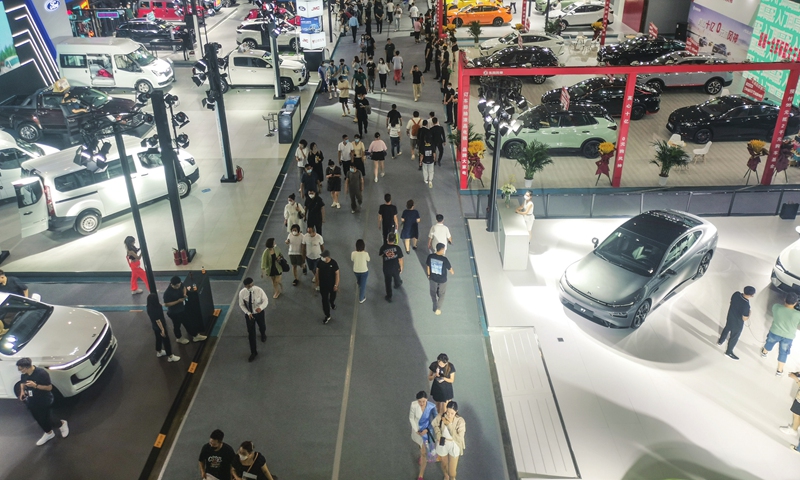
Visitors pass by a new-energy vehicle (NEV) and smart car show as it kicks off in Shenyang, capital of Northeast China's Liaoning Province on June 21, 2022. China produced 466,000 NEVs in May, with 447,000 sold, both up 1.1 times from the year before, industry data showed. Photo: cnsphoto
Global carmakers, including BMW, Honda and Volkswagen, have announced plans for new factories and expanded production in China, confirming their long-term commitment to and confidence in the Chinese market, bolstered by an accelerated recovery in China's auto market, the largest in the world, and a vast potential for growth.
On Thursday, BMW Brilliance's Plant Lydia was officially opened in Shenyang, Northeast China's Jilin Province. With an investment of 15 billion yuan ($2.2 billion), the plant is the biggest single investment in BMW's history in China, according to a statement sent by the group to the Global Times.
The opening of BMW's plant followed the groundbreaking for a new electric vehicle (EV) assembly plant of Japanese carmaker Honda in South China's Guangdong Province.
Honda Motor Co said on Tuesday that its joint venture in China with Guangzhou Automobile Group has begun building an EV plant in Guangdong, which has an initial investment of 3.49 billion yuan. The goal is to have the factory in operation in 2024 with an annual production capacity of 120,000 units.
Separately, Volkswagen Anhui, a EV-focused joint venture of the German automaker in East China's Anhui Province, saw its first body-in-white car come off the assembly line on Wednesday, an important sign of progress in the trial production of Volkswagen Anhui's first new-energy model.
Volkswagen Anhui told the Global Times that it is pushing ahead with production at full speed and production is expected to start in the second half of 2023.
The series of moves made foreign car brands in the Chinese market come as China has issued a number of policies to boost the EV sector as well as the broad auto industry, as a part of efforts to stabilize the economy amid disruptions posed by COVID-19.
The new factories of the joint ventures are mainly designed for the production of new-energy vehicles (NEVs), which could help the companies take advantage of a window of opportunity, build up capacity and enjoy the dividends of China's policy, Zhang Xiang, a research fellow at the Research Center of Automobile Industry Innovation of the North China University of Technology, told the Global Times on Thursday.
"China is the world's largest market for NEVs with the most complete automotive industry chain in the world. For international car companies, seizing the policy dividend window to set up factories in China to expand production capacity is their best choice," Zhang said.
In the latest policy move, an executive meeting of the State Council, the country's cabinet, on Wednesday said that China will extend the tax exemption on new-energy car purchases and promote the used car market, as part of a plan to boost car consumption.
These measures are expected to drive China's auto and related consumption up by about 200 billion yuan.
The opening of Plant Lydia is an important step for BMW Group's accelerated transformation to electrification. In 2023, the range of BMW Group electrified products in China will rise to 13 models, the group said.
With the opening of Plant Lydia, the investment in the Shenyang Production Base totals 83 billion yuan and overall production capacity is being increased to 830,000 units per year.
Data from the China Association of Automobile Manufacturers showed that the production and sales of NEVs reached 466,000 and 447,000 respectively in May, both showing year-on-year growth of 110 percent.
In another sign of the rapid rise of China's NEV manufacturing sector, Tesla's Shanghai output more than tripled in May as supply chains rebooted, and Tesla's locally made vehicle production hit 33,544 in May, a surge of 212 percent from April, the China Passenger Car Association said.
In comparison, Tesla's new plants in Texas and Germany are reportedly losing billions of dollars as the electric carmaker struggles with production due to supply chain disruptions and battery shortages, according to media reports.




